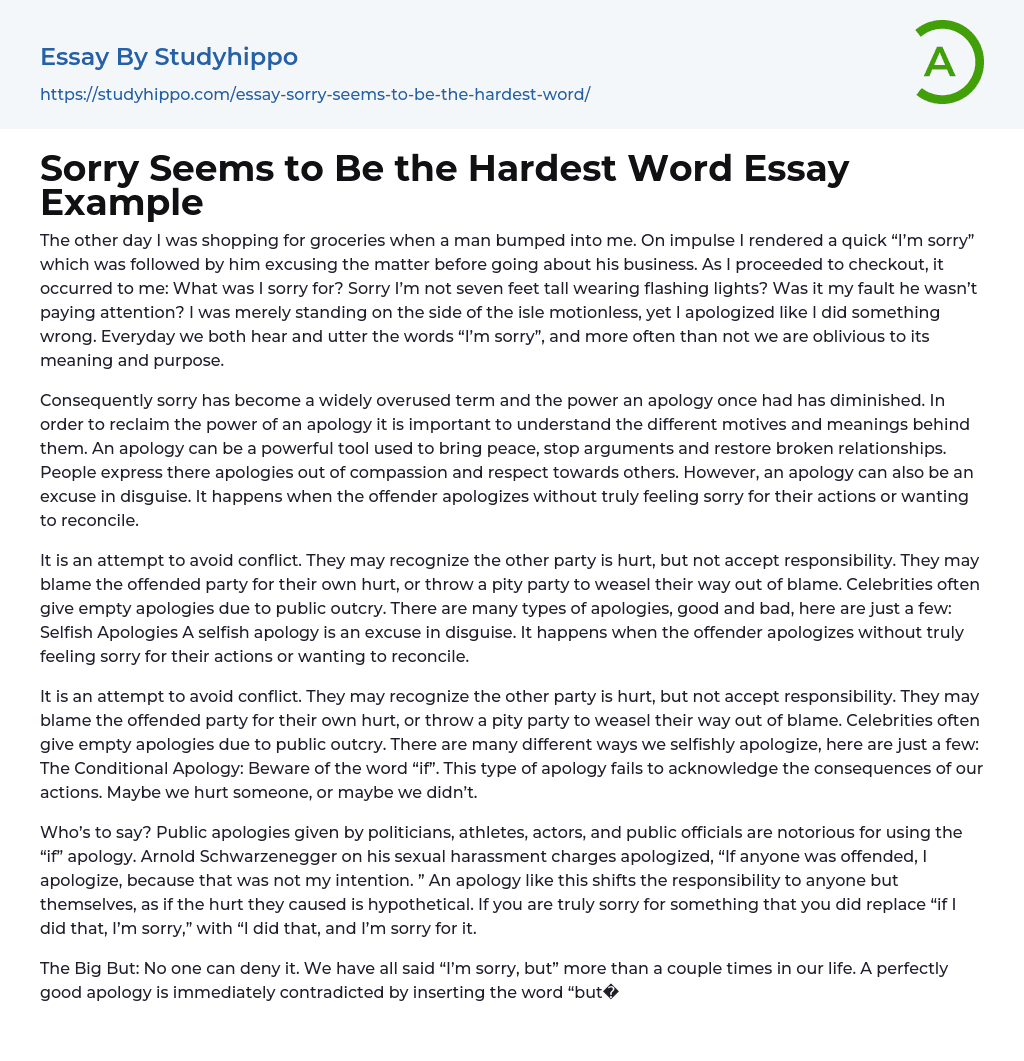The other day I was shopping for groceries when a man bumped into me. On impulse I rendered a quick “I’m sorry” which was followed by him excusing the matter before going about his business. As I proceeded to checkout, it occurred to me: What was I sorry for? Sorry I’m not seven feet tall wearing flashing lights? Was it my fault he wasn’t paying attention? I was merely standing on the side of the isle motionless, yet I apologized like I did something wrong. Everyday we both hear and utter the words “I’m sorry”, and more often than not we are oblivious to its meaning and purpose.
Consequently sorry has become a widely overused term and the power an apology once had has diminished. In order to reclaim the power of an apology it is important t
...o understand the different motives and meanings behind them. An apology can be a powerful tool used to bring peace, stop arguments and restore broken relationships. People express there apologies out of compassion and respect towards others. However, an apology can also be an excuse in disguise. It happens when the offender apologizes without truly feeling sorry for their actions or wanting to reconcile.
It is an attempt to avoid conflict. They may recognize the other party is hurt, but not accept responsibility. They may blame the offended party for their own hurt, or throw a pity party to weasel their way out of blame. Celebrities often give empty apologies due to public outcry. There are many types of apologies, good and bad, here are just a few: Selfish Apologies A selfish apology i
an excuse in disguise. It happens when the offender apologizes without truly feeling sorry for their actions or wanting to reconcile.
It is an attempt to avoid conflict. They may recognize the other party is hurt, but not accept responsibility. They may blame the offended party for their own hurt, or throw a pity party to weasel their way out of blame. Celebrities often give empty apologies due to public outcry. There are many different ways we selfishly apologize, here are just a few: The Conditional Apology: Beware of the word “if”. This type of apology fails to acknowledge the consequences of our actions. Maybe we hurt someone, or maybe we didn’t.
Who’s to say? Public apologies given by politicians, athletes, actors, and public officials are notorious for using the “if” apology. Arnold Schwarzenegger on his sexual harassment charges apologized, “If anyone was offended, I apologize, because that was not my intention. ” An apology like this shifts the responsibility to anyone but themselves, as if the hurt they caused is hypothetical. If you are truly sorry for something that you did replace “if I did that, I’m sorry,” with “I did that, and I’m sorry for it.
The Big But: No one can deny it. We have all said “I’m sorry, but” more than a couple times in our life. A perfectly good apology is immediately contradicted by inserting the word “but”. Rather than admitting to the wrongdoing it justifies our actions, thereby freeing us of responsibility. The Blame Game: How many times have you been the recipient of “I’m sorry you feel that way. ”? This is a common bad
apology, which deflects responsibility onto the offended person.
It is often said in an accusing tone of voice followed by a statement that justifies the actions of the offending person. In essence saying “It is your fault you feel this way and I can’t control your feelings, nor am I responsible for them. Sincere Apologies A sincere apology can be a powerful tool used to bring peace, stop arguments and restore broken relationships. Furthermore we express these apologies through the compassion we have for others and out of respect. Here are a few of the ways we sincerely apologize.
- Chief Executive Officer essays
- Convenience Store essays
- Firm essays
- Training And Development essays
- Unilever essays
- Variable Cost essays
- Virgin Group essays
- Bargaining essays
- Entity essays
- Pest analysis essays
- Child essays
- Childcare essays
- Child labor essays
- Doll essays
- Emergence essays
- Anxiety Disorder essays
- Post-traumatic Stress Disorder essays
- Values of Life essays
- Ethical dilemma essays
- Normative Ethics essays
- Virtue Ethics essays
- Belief essays
- Deontology essays
- Moral essays
- Virtue essays
- Work Ethic essays
- Leadership and Management essays
- Change Management essays
- Project Management essays
- Knowledge Management essays
- Operations Management essays
- Quality Management essays
- Risk Management essays
- Scientific Management essays
- supply chain management essays
- Performance Management essays
- Time Management essays
- Brand Management essays
- Total Quality Management essays
- Risk essays
- Manager essays
- Leadership essays
- Business Ethics essays
- Board Of Directors essays
- Product Management essays
- Comparative Analysis essays
- Decision Making essays
- Dispute Resolution essays
- Stress Management essays
- Business Management essays




